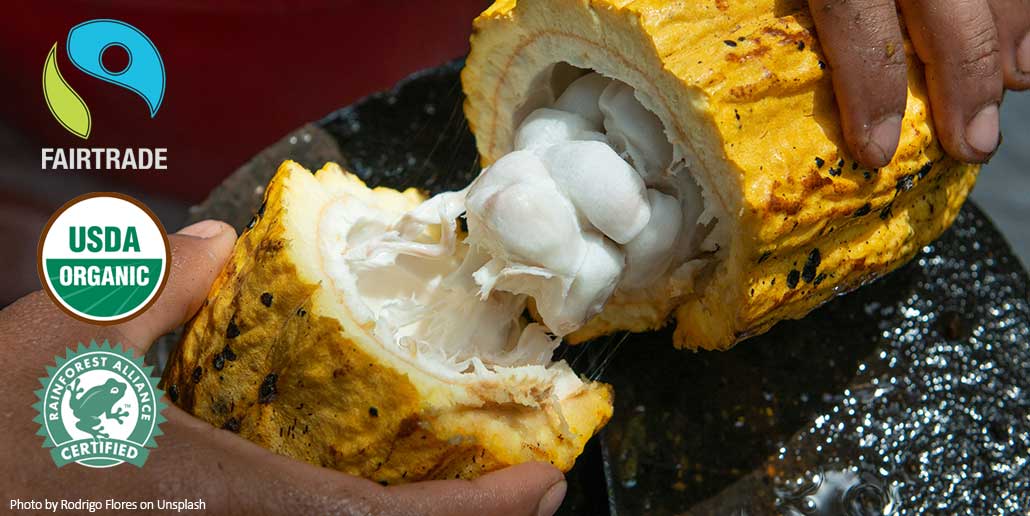
Sustainable Sweetness
Chocolate is one of the most beloved treats in the world, enjoyed by millions daily. However, behind its rich and indulgent flavour lies a complex supply chain that involves farmers, workers, and ecosystems across the globe. In recent years, growing consumer awareness and demand for ethical and sustainable practices have significantly shaped the chocolate industry. Certifications like Fair Trade, organic, and Rainforest Alliance have emerged as critical tools to address these concerns, offering assurances of environmental conservation, ethical labour practices, and equitable trade.
This article delves into the latest updates on Fair Trade, organic, and Rainforest Alliance certifications, highlighting key statistics, success stories, and the persistent hurdles that need to be addressed. With a focus on transparency, innovation, and collaboration, the future of ethical chocolate production depends on the efforts of every stakeholder—from farmers and manufacturers to consumers.
Fair Trade Certification
Fair Trade certification ensures that cocoa farmers receive equitable compensation, adhere to labour standards, and engage in environmentally sustainable practices. As of 2016, at least 29% of global cocoa production complied with voluntary sustainability standards, including Fair Trade. However, the benefits of certification can vary based on farm size; farms smaller than one hectare often face challenges in reaping these benefits due to high upfront certification costs and limited access to cooperatives.
Organic Certification
Organic certification mandates that cocoa is cultivated without synthetic pesticides or fertilizers, promoting ecological balance and biodiversity. Companies like Navitas Organics source regenerative, organic cacao from cooperatives such as the Liloma Cocoa Cooperative in Sierra Leone, which is Regenerative Organic Certified. This approach not only supports environmental health but also offers farmers premium prices for their produce.
Rainforest Alliance Certification
The Rainforest Alliance certification focuses on sustainable farming practices, biodiversity conservation, and improved farmer livelihoods. In 2018, the Rainforest Alliance merged with UTZ Certified to streamline certification processes and enhance their impact. Despite these efforts, challenges remain. For instance, investigations have revealed that significant portions of cocoa used by major chocolate companies, including Mondelez International, were grown illegally in protected areas of the Ivory Coast and Ghana, leading to substantial deforestation. Mondelez has since taken steps to map its cocoa suppliers to combat deforestation.
Regenerative Cacao Initiatives
Beyond traditional certifications, regenerative cacao practices have emerged, emphasizing biodiversity and ecosystem restoration. Companies like To’ak Chocolate in Ecuador collaborate with conservation organizations to convert deforested lands into biodiverse agroforestry systems. These initiatives not only restore forests but also provide farmers with premium prices, sometimes 200% to 800% above Fair Trade prices, depending on the cacao variety.
Challenges and Considerations
While certifications aim to promote sustainability, their effectiveness can be influenced by various factors:
- Economic Disparities: The premium prices consumers pay for certified chocolate do not always translate into proportional income increases for farmers. Factors such as farm size, access to cooperatives, and the ability to improve productivity play significant roles in determining the benefits of certification.
- Deforestation Concerns: Despite certification efforts, deforestation remains a pressing issue. Reports indicate that from January 2019 to January 2022, approximately 58,918 hectares of forest were converted into cocoa plantations in Côte d’Ivoire and Ghana combined. This highlights the need for more robust traceability and sustainable sourcing practices within the industry.
- Certification Costs: The expenses associated with obtaining certifications can be prohibitive for small-scale farmers, particularly those managing less than one hectare. High upfront costs and complex certification processes can limit participation, underscoring the need for more accessible and supportive systems.
The landscape of chocolate certifications is continually evolving, with increasing emphasis on sustainability, ethical practices, and environmental conservation. While certifications like Fair Trade, organic, and Rainforest Alliance have made strides in promoting these values, challenges persist. Economic disparities, deforestation, and accessibility of certifications for small-scale farmers remain critical issues. Emerging practices, such as regenerative cacao, offer promising avenues for addressing these challenges by integrating ecological restoration with economic benefits for farmers. Ongoing efforts and collaborations among stakeholders are essential to foster a more sustainable and equitable chocolate industry.

